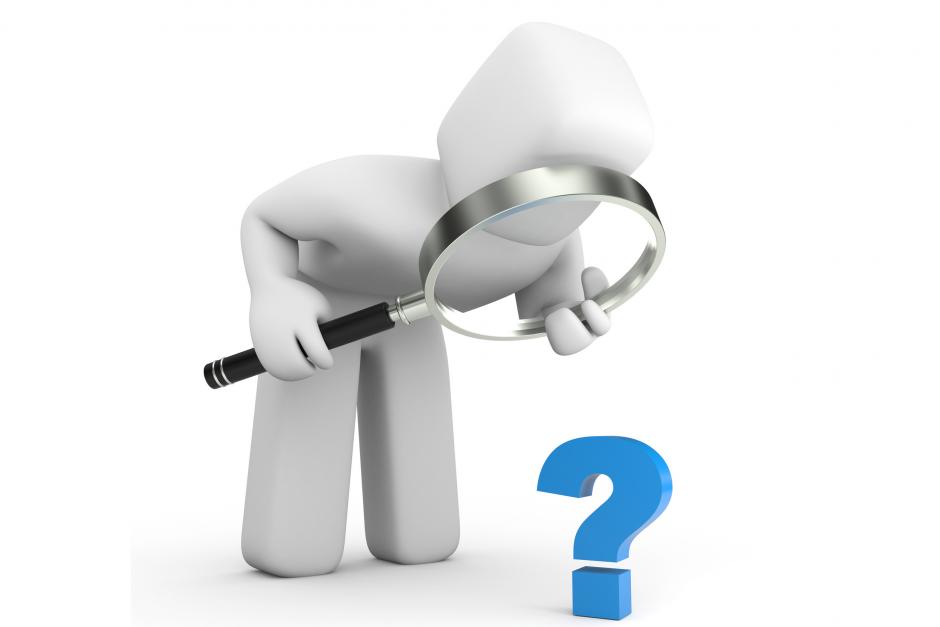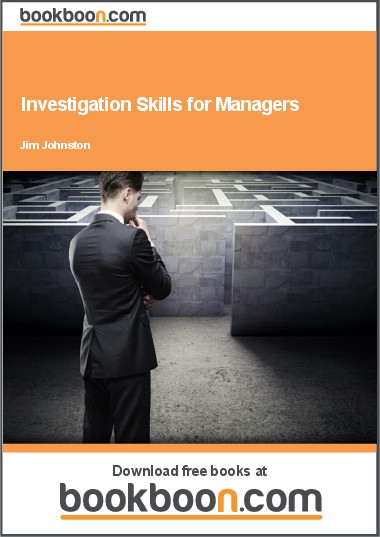How to master investigations


One of the skills that managers should definitely look into is investigations. Bookboon author Jim Johnston explains their role in organisations. Read on!
1. Why are investigations important?
There are two reasons why investigations are important. Firstly, and most importantly, to be fair. An investigation looks at what happened and why it happened. It looks at the causes; the immediate cause, the root cause, and the underlying cause. It looks at the behaviours of everyone involved and works out why people behaved in the way that they did. Finally, the recommendations that are made are done with the purpose of preventing the event happening again, not punishing the guilty. The second reason is to meet the requirements of employment hearings. European legislation on employment is grounded in the principle of fairness and employment hearings want to know that employers have done everything possible to be fair. Investigations form a part of the process that proves the decisions made were done as a result of a full consideration of all the facts and opinions, and not a knee jerk reaction to an adverse event.
2. When it comes to an interview, how do you know that someone is lying? How should you react?
It depends on what you consider as lying. Very few people will deliberately mislead an investigation, but most will be very cautious in the answers that they give. Quite a few people don’t want to be involved, so they will say they saw nothing, and I will deal with these in a moment.
I don’t think of people as lying, because then I am trying to trip them up, which makes the interview a battle where someone is going to win and the other person lose. Rather I just consider what they are saying as their version of what happened. My job is to create the atmosphere where we are both relaxed and trust is established. As I listen I will hear inconsistencies and will question these to get clarity. People are inconsistent for many reasons, not just because they are deliberately lying.
Having said this, you do come across people who lie, and when they do they tend to do one of two things. Either they give shorter answers, or they over elaborate on the detail. The problem when you are lying is twofold; one is thinking of the answer you are going to give, and secondly is remembering the answers you have given. The longer the interview goes on, the harder this becomes, and the more inconsistencies appear. This takes me back to what I just said, listening for the inconsistencies and then seeking clarity.The lies become unsustainable and the truth comes out, usually with an apology which I accept graciously and move on to what actually happened. If at any point you accuse someone of lying then trust is broken and you will get no more information from them. Interviews are all about rapport, and understanding that people talk to people they trust, and hold back on those they don’t.
I said earlier that there are those who don’t want to be involved, so say they saw nothing. That is OK, until the moment of memory recall. In my experience, those who ‘suddenly’ remember key details tend to only remember the details that favour the applicant, and rarely favour the company. So for everyone who says they saw nothing I record a statement to this effect. In the book I have provided an example form which many businesses use. Called the ‘Elimination Statement’ it has a simple statement at the top to the effect that the signatories have no information to offer, and those claiming to have no information sign it. If at a later date they remember something, a statement is recorded, but both statements are submitted. At a hearing, the witness has to explain why they have two versions of events, and which one is correct. They also have to explain why there is an incorrect version, which tends to reduce their value as a witness. In summary, don’t worry about lying, ask questions, listen to the answers and explore inconsistencies.
3. Who are the professionals who are trained in investigation skills? Are these the same people who are trained in health & safety?
Professional investigators come in many forms. Many start out in some sort of police agency; I started as a Military Policemen, but there are other routes. Air accident investigators, maritime investigators, firemen, government fraud investigators, all are trained professionally and gain many skills as they gain experience. However, the fundamentals are the same, regardless of what is being investigated, and the book deals with these. Health & Safety Investigators tend to come through business and somehow get seconded to a H&S department before developing the interest and skills through training and experience. Quite a lot of my work comes through Health and Safety managers who cannot do all the investigations themselves, and need either a small team, or all managers correctly trained. The second source of work from me, is from HR Managers. HR staff have to investigate highly sensitive issues, but no where in HR is there an avenue of formal training on how to conduct an investigation. The third source is from smaller businesses that cannot afford dedicated HR or H&S staff and have no experience or expertise in investigations bar police crime dramas. The book is aimed at those who cannot access formal training for themselves, or access to those formally trained.
One point that is worth making is that professional investigators have some sort of authority to investigate. They can ‘require’ witnesses to talk to them and can have a recourse in law if a witness does not tell the truth. With managers, HR professionals and H&S, we don’t have this legal authority some have to be far better at influencing people, building rapport and trust and being aware of the long term impact of investigations conducted badly.
4. How do you ethically start an investigation regarding someone who’s had a long term sickness leave?
These can be the toughest investigations to do, as it can be seen as punishing the sick. The problem that we have is that there are two opposing interests, protecting the individual and protecting the company and everyone else who is working there. Let’s start with purpose. The investigation is to investigate the prospect of the person returning to work and when this might happen. Most companies have a sick pay scheme, usually backed with government support, but payments to the individual tend to reduce over time. So it is in the interests of both sides to find a way of getting the person back to work where the company get the work for the wages they are paying, and the individual enjoys a full salary again.
Now we have purpose, what do we investigate? We need to establish what the issue is, how it prevents the person working, what exactly they cannot do, treatments available and being received, and what the future holds. Armed with this information discussions can take place on how the person can return to work, what dutiies they will perform, the hours they will work, place of employment and how the business will support them.
The question though was how do you ethically start. The answer is that from the time they go sick, the company should maintain contact. Most businesses count long term absence as any period of absence longer than two weeks. There is also what is known as a long term condition, such as diabetes. This might cause frequent incidents of absence rather than one continual period, and many illnesses that cause an initial long term absence, can turn into a long term condition.
At the three week point (or whatever the procedures dictate) a simple telephone call asking how they are is a good way to start. You might consider a formal letter, but include an assurance that the individual’s health is of primary importance. At the end of the call, arrange when the follow up call will be, say weekly to review progress. Making contact early on keeps suspicion levels low, builds trust and keeps a dialogue going.
5. How about in terms of someone being bullied?
A very common complaint and something managers are likely to be involved in. Before we start we need to understand some key principles. Firstly, bullying is in the ‘eye of the receiver’. This means that if a person thinks they are being bullied, then they are. It isn’t that they need to ‘ toughen up’, or ‘get a sense of humour’. Secondly, intention is irrelevant. This means that the person accused of the bullying doesn’t have to mean it. In reality, most bullying is unintentional, more of behaviour gone wrong. Thirdly, the behaviour does not have to be aimed at the individual, they could just be in the vicinity and find a conversation between two others offensive. Lastly, the behaviour doesn’t have to be continual, it could be one incident or lots of incidents.
This makes investigations into bullying very sensitive. They are often highly emotional and the facts hard to establish, especially if the conversation was one-on-one. For most companies, bullying is also Gross Misconduct, so someone could lose their income over this as it is very hard to get re-employed if you lost your last job because you were a bully. The starting point is to interview the complainant and get their story. It is also worth asking what they want to happen as often they just want the behaviour to stop rather than the ‘bully’ being formally investigated. In this case, a quiet word with the individual is often enough, normally because they didn’t realise the other person felt that way. A joint meeting can then be held (facilitated) to agree the way forward. The situation has then been handled sensitively, discreetly, the complainant has achieved a positive outcome and the ‘bully’ has learned a valuable lesson safely.
6. Can you tell us about an investigation that you were involved in that was particularly difficult?
WOW!, that’s a tough one. A few spring to mind but there is one stand out when one of my Team Leaders was accused of punching a lady worker in his team. I wasn’t on the shop floor at the time and there was a big fuss as you can imagine. My initial steps were to suspend Tim (the Team Leader) on full pay for 24hrs as I had to get him off site to prevent a riot. He was a big fit guy, but not known to have a temper. The women, lets call her Helen, was not the most pleasant of characters, and where Tim was white, Helen was black, further complicating matters. By the time I went home I had eleven witnesses who all said they had seen Tim punch Helen because she sat on his stool (All TL’s had a stool and a bench to do paperwork.)
I need to keep this short, but my starting point was the witnesses. Of the 11 who claimed to have seen the incident, two were not in the building. I found this by checking clock cards. Seven were not in the right place to have seen or heard anything, and the two who were in the right place heard a commotion and turned to look, so only saw the aftermath, not the alleged incident. Helen was adamant she had been punched, and having investigated many assaults as an MP, I was detailed in my questioning to get the details of her story. She had been sat on the stool, when for no reason, Tim punched her on the jaw. The problem I had was that Helen had a slap mark on her right cheek, and no evidence of a punch. A slap mark is the imprint of the palm and red skin round the area. A punch is much more brutal, tends to break the skin and can break bones. Also, punches tend to have corresponding injuries on the fist of the puncher, and before suspending Tim I had examined his hands. there were no corresponding injuries.
The other big concern is that Helen had been hit on the left cheek. Which meant that from her description the person who assaulted her was right handed. I knew that Time was left handed, so there was no way that he had committed the assault. I also had some cctv that showed Helen entering the ladies changing room with a friend 15 minutes before the alleged assault. Interestingly, this friend wasn’t a witness, but I decided to interview her anyway. At the interview she admitted that she and slapped Helen and the reason? Tim was gay, and they didn’t like that so tried to get him dismissed.
There was a lot more then that followed on, but the story is too big for this interview. The story relates back to your earlier question about lying, as pretty much every was lying here, everyone apart from Tim. WE didn’t accuse anyone of lying, just asked pointed questions such as ‘it is company policy that everyone on site must have clocked in. At the time of the assault you say you witnessed, you had not clocked in, nor is there any record of you being on shift for any reason. Please explain why you didn’t clock in or report to your line manager?’ The answer: ‘I wasn’t in the building and I didn’t see the assault’.
Learn more about investigations thanks to Jim Johnston’s eBook, Investigation Skills for Managers.




